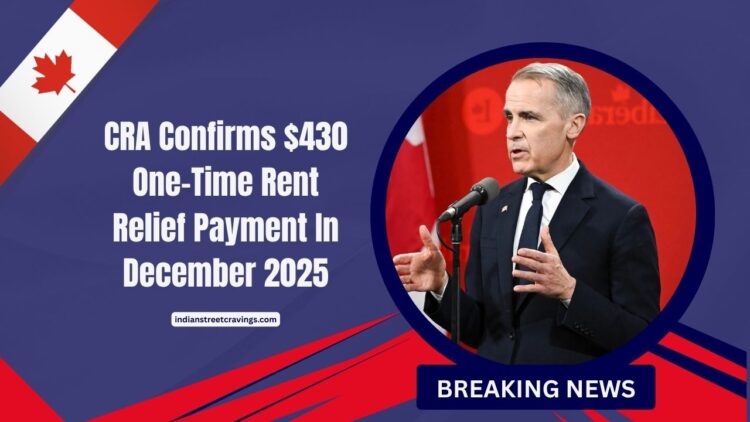Thousands of Canadian renters will receive much-needed financial support this December, as the Canada Revenue Agency (CRA) launches the $430 Rent Relief Canada December 2025 initiative.
This one-time, tax-free payment aims to assist low- and moderate-income households struggling with rising rental costs ahead of the winter season.
Here’s everything you need to know about the payment—who qualifies, how to apply, when it will be deposited, and how to make sure you don’t miss out.
What Is the $430 Rent Relief Canada Program?
The $430 Rent Relief is a non-recurring housing assistance payment offered by the federal government. It is separate from regular housing benefits like the Canada Housing Benefit and is designed as an emergency measure to alleviate rent burdens during December 2025.
The payment is managed by the CRA, which will verify income details using your 2024 tax return and process the amount via direct deposit or cheque.
Eligibility Criteria for the $430 Housing Aid
To qualify for the relief, applicants must meet the following eligibility requirements:
- Be a Canadian citizen or permanent resident
- Be at least 15 years old as of December 1, 2025
- Filed a 2024 income tax return
- Annual income thresholds:
- Up to $35,000 for single individuals
- Up to $45,000 for couples with no children
- Up to $55,000 for families with children
- Must spend at least 30% of gross income on rent
- Must provide a valid lease agreement or rent receipt
Failure to meet these criteria or submit accurate documents will result in application denial.
Payment Timeline and Amount Breakdown
The CRA has confirmed that eligible Canadians will receive their $430 payment between December 15 and December 22, 2025. Here’s a breakdown:
| Household Type | Income Limit | Rent Paid Monthly | Relief Amount | Deposit Dates |
|---|---|---|---|---|
| Single Adult | Up to $35,000 | Over $875 | $430 | Dec 15 – Dec 22, 2025 |
| Couple, No Children | Up to $45,000 | Over $1,125 | $430 | Dec 15 – Dec 22, 2025 |
| Family with Children | Up to $55,000 | Over $1,375 | $430 | Dec 15 – Dec 22, 2025 |
Make sure your 2024 tax return is filed by November 2025, or your eligibility may not be processed in time.
How to Apply for the $430 CRA Rent Relief
Applications will be accepted via the CRA website or your CRA MyAccount portal starting in late November 2025.
You’ll Need:
- SIN (Social Insurance Number)
- Lease agreement or official rent receipt
- Rent payment details for 2025
- 2024 income verification (pulled automatically by CRA)
- Direct deposit information
Once submitted, you’ll receive a confirmation email within 3–5 business days. Approved applicants will receive their funds before December 25, 2025.
Why This One-Time Relief Matters
With many Canadian households spending over 30% of their income on rent, this $430 payment offers timely support during a season when expenses like heating bills, groceries, and childcare spike.
It may not be recurring, but this direct payment can help families avoid evictions, cover back rent, or afford basic holiday needs. Unlike traditional aid programs, this initiative is fast, non-taxable, and doesn’t affect your eligibility for other benefits.
How It Compares to Other Housing Programs
- Not linked to Canada Housing Benefit
- No interviews or long wait times
- Tax-free and does not affect other CRA benefits
This is a standalone relief and does not impact your existing provincial or federal benefits.
The CRA’s $430 rent relief is a vital short-term measure for Canadians struggling with rent. If you qualify, make sure you act fast:
- File your taxes for 2024 by November
- Prepare proof of rent payments
- Update your CRA MyAccount and banking info
This program could reach tens of thousands of households. If demand is high, there’s even potential for it to expand.
FAQs
Is the $430 rent relief payment taxable?
No, the payment is non-taxable and does not count as income on your 2025 tax return.
What happens if I miss the application window?
Late applications may be rejected. Ensure you apply during the late November 2025 window.
Can I apply if I live in subsidized housing?
Yes, but you must meet the income and rent spending criteria like all other applicants.
